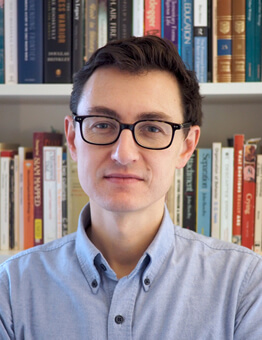
Edge Prize 2019: Etienne Benson

Following the footsteps of numerous STS researchers, Benson’s article sheds light on a practice that is unknown to many (if not most) of us: bird banding. Bird-banding is the practice of attaching metal rings stamped with serial number to the legs of birds so that they can be identified at a later date. In his article, Benson conducts an in-depth analysis of the case and history of bird-banding from the 1920s onward, showing that its success depended on a fragile balance between the centripetal effects of national coordination and the centrifugal effects of volunteer enthusiasm.
Benson compellingly argues for ‘bird-banding’ as a precursor to contemporary citizen science projects. In his narrative he conjures the actors, knowledges and actions that bring it to life, using the metaphors of centrifugal and centripedal forces to brilliantly expose the distinct interests and power of the parties involved in the growth of a project. It is a refreshing narrative that highlights modes of collaborative work even when exposing problems.
Benson’s is a historical analysis but it resonates with contemporary discourses and initiatives. Bird banding, Benson shows, is an analogic ‘big data’ effort, and it is also an instantiation of a ‘citizen science’ project. In speaking to contemporary issues, his article comes across both as wonderfully descriptive and as a heuristic tool to understand current efforts to democratize and open up science. As such, it has much to teach us about the workings of science and its politics.
Benson’s article was selected from 35 nominees, published in a wide range of international, high-quality journals. This large pool of candidates included provocative and important contributions that represent the breadth and depth of STS scholarship. We are pleased to honor the winning paper as among the best of what STS has to offer, and recommend it as a brilliant, exciting, and moving read.
2019 Edge Prize Committee: Maria Belén Albornoz, Latin American Faculty of Social Sciences (FLACSO), Ecuador (Council Member), and Ana Viseu, Universidade Europeia and CIUHCT, Portugal (Council Member), Teun Zuiderent-Jerak, VU University, Amsterdam, The Netherlands (Council Member, Chair).
Acceptance statement
I am honored to accept the 2019 David Edge Prize and would like to thank the prize committee for its careful and generous reading of my article. My aim in writing it was to think through some of the promises and contradictions of contemporary citizen science by posing it against the historical case of early twentieth century bird banding, with the help of both the STS scholarship on centers of calculation and the recent outpouring of critical scholarship on data. To the extent that the article does justice to the latter, it is largely thanks to Elena Aronova, Christine von Oertzen, and David Sepkoski, who organized a series of meetings at the Max Planck Institute for the History of Science in Berlin around the theme of data histories and edited the issue of Osiris in which this article appeared. The article’s engagements with the materiality of data and the politics of citizen science were shaped by the conversations they fostered at those meetings and by their editorial guidance as the project moved toward publication. As I found in those conversations, and as I hope the article shows, STS offers a rich set of tools and concepts for helping the past speak to the present. I am grateful to be a member of this stimulating and supportive community.
Bio
Etienne S. Benson is Associate Professor of the History and Sociology of Science at the University of Pennsylvania. His research concerns the history of environmentalism, the environmental sciences, and human-animal relations in the nineteenth and twentieth centuries. He is the author of Wired Wilderness: Technologies of Tracking and the Making of Modern Wildlife (Johns Hopkins University Press, 2010) and the forthcoming Surroundings: A History of Environments and Environmentalisms, to be published by the University of Chicago Press in 2020.
